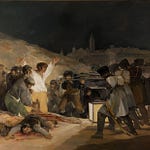This week, we're bringing you something special: our first recording with a live audience! Hosted by the University of Pittsburgh's Center for Governance and Markets and moderated by the center's director, Jen Murtazashvili (a friend of the Crowd), we had a freewheeling discussion about Shadi's new book, The Problem of Democracy.
Shadi made his case for decoupling democracy and liberalism—what he calls "democratic minimalism." Instead of viewing democracy as a means to other ends, it should be seen an end unto itself. In other words, let us lower expectations and like (and perhaps even love) democracy for its more modest pleasures. Democracy is not about delivering economic growth, competence, or consensus. And it may even produce the opposite.
The argument, expressed in its more provocative form, is that democracy is about a way of making choices, while liberalism is one choice among many. Citizens in conservative societies may choose otherwise—including by passing restrictions on abortion, alcohol consumption, and even "blasphemy laws" that prohibit insulting divine texts and prophets.
Losing no time, Damir and Jen (and audience members) pose a series of challenges to Shadi's idiosyncratic view of democracy. Is this minimalistic conception of democracy realistic, even if it were desirable? Jen thinks that there needs to be a classically liberal limited state whereas Damir isn't so sure that ethnically and religiously divided countries are places where democracy flourishes. Is it enough to simply ask citizens to accept democratic outcomes not to their liking? Or must there be a deeper, shared cultural bond before anything else?
On foreign policy, things get even more thorny. Can the United States truly promote democracy without doing damage to its own national security interests? The problem is that reasonable observers no longer agree, if they ever did, on which vital interests are, in fact, "vital." And, if America is a superpower, presumably it could absorb the costs of a democracy-first policy in the Middle East if it really wanted to.
As the event became more of a free-for-all, extending into 2 hours of spirited exchanges with the audience, the crowd debated sharia courts, India under Modi, whether Obama actually had a dislike for Muslims, whether Israel was the ideal "illiberal democracy", what making America "more democratic" means, and the resiliency of American institutions over the last six years.
Required Reading:
The Problem of Democracy: America, the Middle East, and the Rise and Fall of an Idea, by Shadi Hamid (Amazon).
Jen Murtazashvili’s personal website.
The Center for Governance and Markets at Pitt.
[Editor’s note: Shadi here. Since this was a relatively raucous debate about my book, would love to hear your thoughts, comments, and criticisms]

















Live In Pittsburgh: The Problem of Democracy